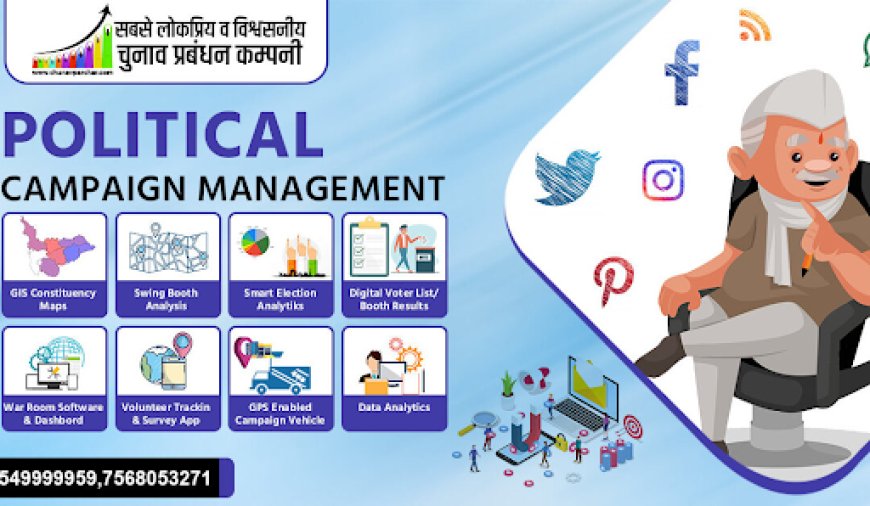Online Political Marketing Strategies for Local Elections
Unlock the potential of online political marketing strategies to engage and energize local voters effectively during critical elections.

The rise of the internet and social media has revolutionized the way political campaigns are conducted. With the majority of people using online platforms to access information and engage with others, it is crucial for local election candidates to have a strong online presence. In this article, we will discuss effective online political marketing strategies for local elections.
Importance of Online Political Marketing
In today's digital age, having an effective online marketing strategy is essential for any campaign. It allows candidates to reach a wider audience, engage with constituents directly, and showcase their platform and values. Additionally, it offers a cost-effective alternative to traditional forms of campaigning such as door-to-door canvassing or TV ads.
Moreover, with the pandemic limiting in-person events and gatherings, online political marketing has become even more critical for candidates to communicate with potential voters.
Building a Strong Online Presence
A strong online presence is essential for any successful political campaign. Here are some strategies for local election candidates to establish their presence:
-
Build a professional website: A well-designed and user-friendly website serves as the central hub for all campaign information. It should include the candidate's bio, platform, upcoming events, and a donation page.
-
Utilize social media platforms: Facebook, Twitter, Instagram, and YouTube are powerful tools for reaching potential voters. Candidates must have active accounts on these platforms to share updates and engage with constituents.
-
Engage with constituents: Social media provides a platform for direct communication with voters. Candidates should regularly engage with their followers by responding to comments and messages and sharing relevant content.
-
Utilize email marketing: Building an email list allows candidates to reach out to potential voters directly. Regular newsletters can be used to highlight campaign updates, upcoming events, and promote the candidate's platform.
-
Leverage online advertising: Targeted online ads on social media platforms and search engines can be highly effective in reaching potential voters. This allows candidates to target specific demographics and geographic locations.
-
Collaborate with influencers: Partnering with popular local influencers or bloggers can help expand the candidate's reach and credibility. These collaborations can include guest posts, endorsements, or sponsored content.
-
Monitor online presence: Candidates must monitor their online presence regularly to stay informed about what voters are saying about them. This will allow them to address any concerns or negative comments promptly.
-
Utilize SEO techniques: Search Engine Optimization (SEO) techniques can help improve a candidate's visibility online. By using relevant keywords and optimizing website content, candidates can increase their chances of appearing in search engine results.
-
Utilize online fundraising: Online platforms such as GoFundMe or Kickstarter can be used to raise funds for the campaign. These platforms allow candidates to reach a wider audience and make it easier for supporters to donate.
-
Host virtual events: With the rise of virtual events, candidates can reach a larger audience through webinars, Q&A sessions, and town halls. This allows them to connect with voters from the comfort of their own homes.
By utilizing these strategies, local election candidates can establish a strong online presence and effectively engage with potential voters.
Leveraging Digital Advertising
Digital advertising offers various options for local election candidates to target potential voters effectively. Here are some strategies for utilizing digital ads:
-
Targeted social media ads: Platforms like Facebook and Instagram allow candidates to target specific demographics based on age, location, interests, etc.
-
Google Ads: By utilizing keywords related to the candidate's platform and location, Google Ads can help candidates reach a broader audience.
-
Display ads: Display ads on popular websites or blogs can increase visibility for the candidate and their platform.
-
Video ads: Platforms like YouTube allow candidates to showcase their message through video advertisements that can be targeted to specific demographics.
-
Email marketing: Building an email list of potential voters and sending targeted emails can be an effective way to reach voters directly.
-
Geofencing: This technique allows candidates to target ads to specific locations, such as polling places or campaign events.
-
Retargeting ads: By using cookies, candidates can retarget ads to users who have previously visited their website or engaged with their social media content.
-
Influencer partnerships: Collaborating with local influencers or community leaders can help candidates tap into a new audience and gain credibility.
-
Mobile advertising: With the rise of smartphone usage, mobile ads can be an effective way to reach potential voters on-the-go.
It's important for local election candidates to not only utilize these strategies but also to continuously monitor and adjust their digital ads to ensure they are reaching the right audience and getting the desired results. Additionally, candidates should be aware of any transparency laws or regulations surrounding digital political advertising in their area. For ads, you can contact to political marketing service provider in India.
Digital ads can play a crucial role in local elections, allowing candidates to reach a wider audience and engage with potential voters on a more personal level. By utilizing various digital ad strategies, candidates can effectively promote their platforms and connect with voters in a modern way. However, it's important for candidates to remember that digital advertising is just one piece of the puzzle and should be integrated with other campaign tactics for maximum impact.
Utilizing Social Media Influencers
Collaborating with social media influencers is becoming an increasingly popular strategy in political marketing. By partnering with influencers who have a relevant audience, candidates can reach potential voters who may not have been aware of their campaign otherwise. However, it is vital to ensure that the influencer aligns with the candidate's values and platform before collaborating.
Engaging Supporters Through Online Events
With in-person events being limited due to the pandemic, online events have become an effective way for candidates to engage with supporters. Here are some ideas for utilizing virtual events:
-
Virtual town halls: Candidates can hold live Q&A sessions with constituents through platforms like Facebook Live or Zoom.
-
Webinars: Hosting webinars on specific topics related to the candidate's platform can help educate and engage potential voters.
-
Online fundraisers: Virtual fundraising events can be held through platforms like GoFundMe or Eventbrite, allowing supporters from all over to contribute.
Utilizing User-Generated Content
User-generated content refers to any form of content created by supporters of a candidate. It is a powerful tool for creating social proof and building trust among potential voters. Here are some ways to utilize user-generated content:
-
Encourage supporters to share campaign material on their social media accounts.
-
Create a hashtag for the campaign and encourage supporters to use it when posting about the candidate.
-
Share user-generated content on the candidate's social media platforms to showcase support from constituents.
What's Your Reaction?
























